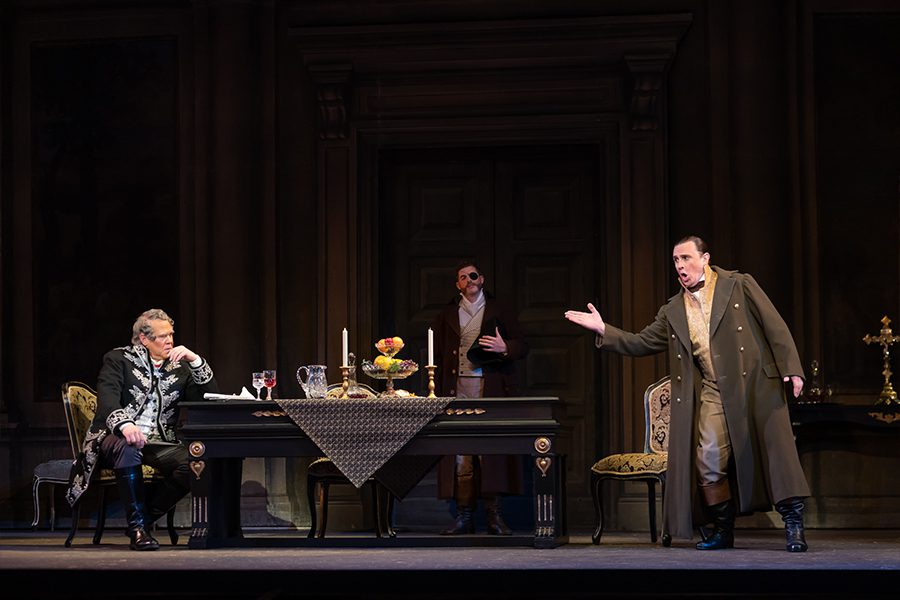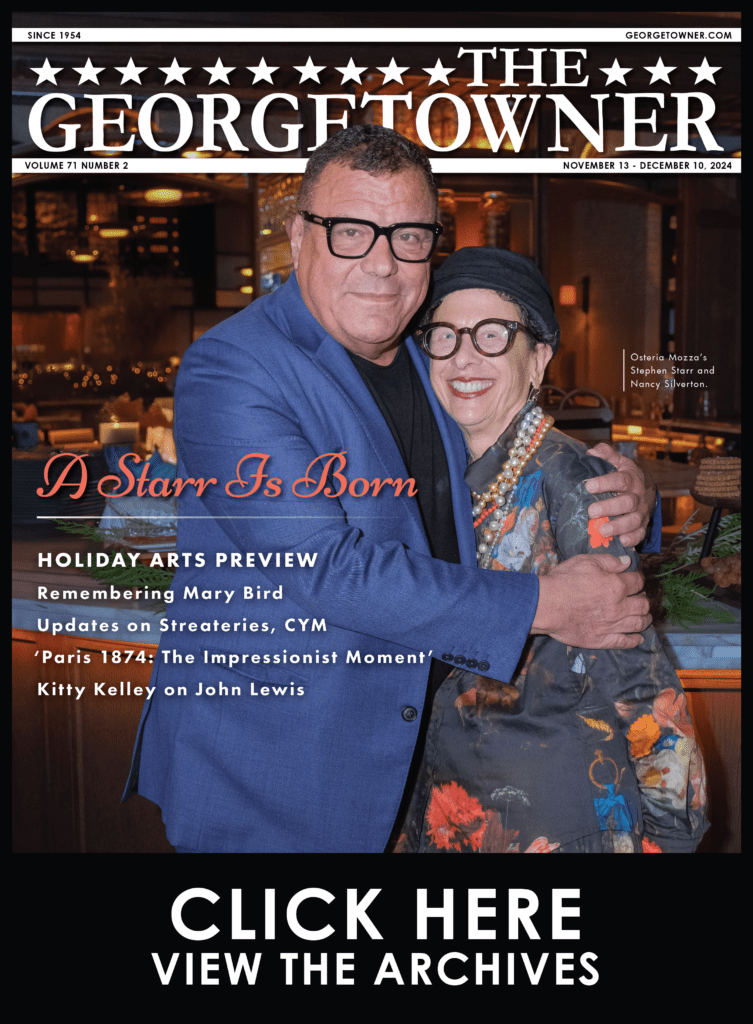LAST CHANCE: Washington National Opera’s ‘Tosca’
By • May 23, 2019 0 635

You always want to think of opera in the form of a night at the opera (the occasion, not the Marx Brothers movie): a night out with a tip of the top hat, carrying a certain formality, accompanied by an electric atmosphere of expectancy.
Going to a recent Sunday-matinee performance of Giacomo Puccini’s “Tosca” in the Kennedy Center Opera House — the final performance will be this Saturday, May 25, at 7 p.m. — doesn’t replicate the outward formality. It’s a near-90-degree, mostly sunny day, no top hats or evening gowns in the afternoon, no solemnity at the outset. But it does retain the electricity, expectancy and anticipation right from the start.
It is still opera, in fact, the opera in many ways, a masterwork of operatic purity in some respects by a giant composer, with the assistance of an intelligent libretto by Luigi Illica and Guiseppi Giacosa, which you want to read for its style and artistry, not just for its explanatory function.
We’re dealing with “Tosca,” after all, and with it all the passions unleashed at full blast and height. It’s operatic in the way lovers of the form would relish and just maybe leave newbies a little awestruck and breathless.
Day or night, it’s a moving, resounding experience.
That has a lot, if not quite everything, to do with the music, whereby Puccini gives you pause, literally, to listen to the shape and sound of characters; there’s a surprising amount of strong and pushy music produced by horns. The thematic sections let us know where we are and who we’re dealing with, and even when, although the complexities of early 19th-century revolutionary politics and history are not so self-evident in the plot (except for one moment when the magic name of Napoleon comes up).
“Tosca” is about tyranny of the worst and cruelest sort, about almost irrational passion, about lechery, religion and courage in the face of bad — very bad and costly — outcomes.
Floria Tosca is the deserved heroine of this opera. A dervish of jealousy, emotion and loyalty, she burns with the understanding of sacrifice — that of others, but also of self-sacrifice and the meaning of consequences. Her lover and grand hero is the artist Mario Cavaradossi, working on a portrait of Mary Magdalene, trying to soothe Tosca’s wrongheaded, furious and coquettish jealousy, protecting a revolutionary friend on the run.
All three — Cavaradossi, the revolutionary friend Angelotti and Tosca — come up against the dark, scheming, cruel and treacherous force of Baron Scarpia, the tyrannical prince of darkness and power in Rome. It’s a battle of darkness and light, truth and lies, love and the avid desire for power and its execution.
Scarpia, a classic (and then some) operatic villain, will do anything to get what he wants: the rebel, the artist and especially Tosca. During the course of the three-act opera, Cavaradossi becomes almost a transcendent hero, while Tosca desperately fights off the schemes and sheer power of Scarpia, hoping to save her lover, herself and her honor.
And, just so you (already) know, things don’t always work out the way they should.
In this — the music and the singers and the conductor and the director — seem always to operate a rung above themselves. They reach a level of performance and result that are eminently satisfying. Soprano Latonia Moore sang the matinee performance. Like her counterpart Keri Alkema, a part of the original Domingo-Cafritz Young Artist Program class, she brought to it a frenetic, wrenching energy, hitting the high emotions and notes, especially in the justifiably famous aria about love and art, “Vissi d’arte” (“I lived for art”).
Tenor Robert Watson seems at first a perfect romantic lead; he’s handsome, energetic, full of goodwill and energy. But then, as he becomes increasingly enmeshed in deadly danger, he seems to grow, vocally and physically, before our eyes. His singing is nothing less than a kind of glory, loudly appreciated by the audience.
When you consider “Tosca,” there is always the presence and the inescapable shadow of Scarpia, in his grey-blue coat, stalking the stage like a predator, acknowledging the depth of his lust and desire, his joy in violence and force.
Here, we have the ultimate Scarpia in baritone Alan Held, who performed the role in Washington National Opera’s 2011 production and elsewhere. Held brings a certain Wagnerian force to the part — which should be no surprise, since he was in “The Flying Dutchman” here and portrayed Wotan in WNO’s Ring Cycle. There is nothing like a full-voiced and self-aware villain, especially in opera. Resistance, in some ways, is futile, although God knows Tosca tries and even seems to succeed, though to no final avail.
There is a temptation in this “In love or war, what do you stand for?” production to try and see ourselves and our times.
That might not quite be a productive approach. The principal actors on our political stage have a long way to go before they achieve the darkness of Scarpia or, for that matter, the courage and passion of a Tosca or a Cavaradossi.
However, in addition to the aforementioned aspects, this production offers a lot: laser-like direction by Ethan McSweeny, flair and sharp and dramatic pacing by conductor Speranza Scappucci.
We could be in our time here. But, really, it’s Puccini’s world.

